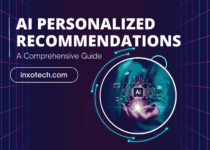Data Privacy in AI Applications: Balancing Innovation and Security
Introduction
Data privacy is a very important topic in today’s artificial intelligence (AI) era. AI applications enable advanced convenience and technology but also raise data protection and security issues. Organizations are now trying to adopt appropriate strategies to protect sensitive information with innovation.
AI-based systems require large amounts of data to improve, but this data can pose a challenge to users’ privacy. This article delves into the complexities of balancing innovation and security, offering insights and actionable strategies for businesses and individuals alike.
The Importance of Data Privacy in AI

Understanding Data Privacy
Data privacy has become a critical topic in today’s technology, especially in artificial intelligence (AI). AI systems require vast and varied types of data to be effective, based on which these systems can solve complex problems, make predictions, and provide personalized services.
The importance of data privacy in artificial intelligence can be better understood when we look at how data powers AI. While AI requires more data for better results, without protecting that data, these applications can prove dangerous. Issues such as misuse of customer information, data leaks, and violations of laws not only expose businesses to fines but also damage their reputation.
Why It Matters
- User Trust: Trust is paramount in the digital age. Users are more likely to engage with AI applications that prioritize their data privacy.
- Regulatory Compliance: Laws such as the General Data Protection Regulation (GDPR) impose strict data protection standards. Non-compliance can lead to hefty fines.
- Reputation Management: Data breaches can severely damage a company’s reputation. Prioritizing data privacy helps maintain a positive public image.
The Intersection of AI and Data Privacy
How AI Works with Data
The main purpose of artificial intelligence (AI) is, ultimately, to analyze data to find solutions to problems and, consequently, facilitate human decisions. Furthermore, AI algorithms are trained on vast amounts of data to recognize patterns, make predictions, and deliver personalized results. This data comes from various sources, such as users’ online activities, social media, and other digital platforms. In the process, AI not only accelerates decisions but also brings innovation to business and everyday life.
Balancing the relationship between AI and data privacy requires adopting advanced technologies such as federated learning and differential privacy. In these ways, AI systems can maintain their performance while protecting user data. Transparency and clear data usage rules also play an important role in maintaining this balance.
In addition, AI systems rely on large datasets to learn and make predictions. However, the effectiveness of AI algorithms often hinges on the quality and quantity of data, which, therefore, raises concerns about how this data is collected and used.
Key Challenges
- Data Collection: AI applications often require extensive data collection, which can infringe on privacy if not handled correctly.
- Data Anonymization: While anonymizing data can protect individual identities, it may not be foolproof. Advanced techniques can sometimes re-identify anonymized data.
- Bias and Discrimination: AI systems trained on biased data can perpetuate discrimination, raising ethical concerns about data usage.
Balancing Innovation and Security
Artificial Intelligence (AI) has become an important source of innovation in today’s world, where it provides effective solutions by analyzing vast data. However, this potential of AI also raises data privacy issues. Protecting sensitive customer information and preventing its illegal use is a challenge for organizations looking to thrive with AI. Ensuring data privacy is not only a legal requirement but also an important means of gaining consumer trust.
Using modern technologies is essential to balance data privacy and innovation. Technologies like federated learning train AI models while keeping data locally secure, reducing the risk of leaking sensitive information. Similarly, differential privacy hides individual identities by adding noise to the data, while maintaining the utility of the aggregate data. Apart from these, transparency and adherence to legal regulations also play an important role in maintaining this balance.
It is this balance that makes AI development ethical and sustainable. Organizations that prioritize data privacy and security not only avoid legal risks but also win consumer trust, which is the foundation of long-term success.
Strategies for Ensuring Data Privacy in AI Applications
1. Implementing Robust Data Governance
Organizations should establish clear data governance policies to oversee data collection, processing, and sharing practices. This includes:
- Defining data ownership and responsibilities.
- Regular audits of data handling practices.
- Ensuring transparency in data usage.
2. Utilizing Privacy-Preserving Techniques
Techniques such as differential privacy and federated learning can help protect user data while still allowing AI systems to learn from it.
- Differential Privacy: Adds noise to datasets, making it difficult to identify individuals while still providing useful insights.
- Federated Learning: Allows AI models to be trained across decentralized devices without sharing raw data, enhancing privacy.
3. Regularly Updating Security Measures
Staying ahead of potential threats is crucial. Organizations should:
- Conduct regular security assessments.
- Implement advanced encryption methods.
- Train employees on data security best practices.
4. Engaging with Users
Involving users in the conversation about data privacy can foster trust. Strategies include:
- Providing clear privacy policies.
- Offering users control over their data.
- Encouraging feedback on data usage practices.
The Role of Regulations in Data Privacy

Key Regulations Impacting AI and Data Privacy
- General Data Protection Regulation (GDPR): Enforces strict guidelines on data collection and processing within the EU.
- California Consumer Privacy Act (CCPA): Gives California residents rights regarding their personal information.
- Health Insurance Portability and Accountability Act (HIPAA): Protects sensitive patient health information.
Compliance Strategies
- Regularly review and update privacy policies to align with changing regulations.
- Implement training programs for employees on compliance requirements.
- Use compliance management software to track and manage regulatory obligations.
FAQs
What is data privacy in AI applications?
Data privacy in AI applications refers to the practices and policies that protect personal information collected and processed by AI systems.
Why is data privacy important in AI?
Data privacy is crucial for maintaining user trust, ensuring regulatory compliance, and protecting an organization’s reputation.
How can organizations enhance data privacy in AI?
Organizations can enhance data privacy by implementing robust data governance, utilizing privacy-preserving techniques, regularly updating security measures, and engaging with users.
What are some regulations affecting data privacy in AI?
Key regulations include the GDPR, CCPA, and HIPAA, which impose strict guidelines on data collection and processing.
Conclusion
The future of AI is promising, but it comes with a responsibility to protect user data. By understanding the challenges of data privacy in AI applications and implementing effective strategies, organizations can foster innovation while ensuring the security of sensitive information. Balancing these two aspects is not just a legal obligation but a moral imperative that can lead to sustainable growth and user trust.


